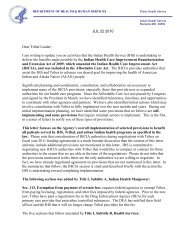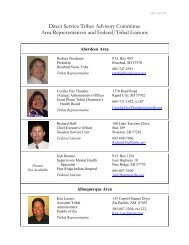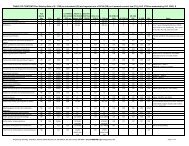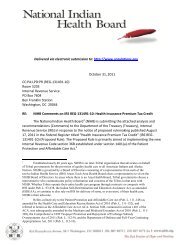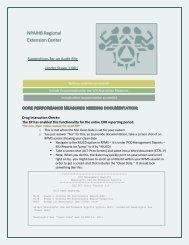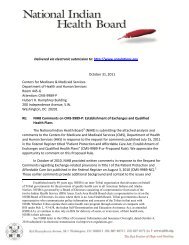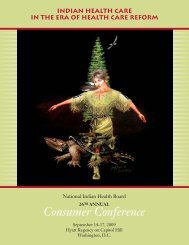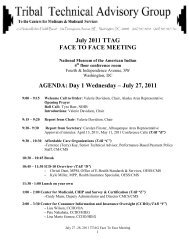mmpc - National Indian Health Board
mmpc - National Indian Health Board
mmpc - National Indian Health Board
Create successful ePaper yourself
Turn your PDF publications into a flip-book with our unique Google optimized e-Paper software.
POTENTIAL RAMIFICATIONS FOR FAILING TO ISSUE UNIFORM OPERATIONAL GUIDANCE:<br />
Failure to issue uniform operational guidance will impede Exchange, Medicaid and IRS staff in making accurate<br />
and consistent determinations of eligibility as well as delay or completely deny access for some AI/ANs to the<br />
<strong>Indian</strong>-specific benefits and protections established under the Affordable Care Act.<br />
Delayed eligibility for some AI/AN children: An AI/AN child who is not allowed to enroll as a tribal<br />
member until her 18 th birthday may not be considered eligible for Exchange-related <strong>Indian</strong>-specific<br />
cost-sharing and enrollment protections, despite being considered an AI/AN for purposes of IHS,<br />
Medicaid and CHIP coverage.<br />
Unwarranted application of tax penalties: If an AI/AN who is eligible and, in fact, is accessing IHS<br />
services decides not to secure health insurance coverage, but is not (ultimately) determined to be<br />
eligible as an “<strong>Indian</strong>” for the exemption from the requirement to secure minimum essential coverage,<br />
this individual could be subject to significant tax penalties imposed under the ACA by the Internal<br />
Revenue Service.<br />
Reduced timeliness: The consolidated and streamlined Medicaid and Exchange application process is<br />
intended to rely, to the greatest extent possible, on electronic verification of application-related<br />
information. The lack of uniform operational guidance would complicate (although not prevent) the<br />
use of automated databases that may be available for electronic verification, such as using the IHS<br />
beneficiary roster, hamper coordination between Medicaid and Exchange eligibility, and likely increase<br />
the administrative costs and burden on individuals.<br />
Reduced accuracy in eligibility determinations: If guidance is not issued by CMS, or if the guidance<br />
issued does not provide uniformity across the <strong>Indian</strong>-specific provisions in Medicaid, Exchange<br />
coverage, and pertaining to the exemption from tax penalties, thereby requiring each Exchange to<br />
identify any differences in eligibility standards under the various definitions, including understanding<br />
the differences, if any, in documentation permitted to satisfy each definition of <strong>Indian</strong>, error rates for<br />
eligibility determinations will increase.<br />
Blocked access for some Alaska Natives: Some Alaska Native adults and children may not be<br />
considered AI/AN by Exchanges until their parents die and they inherit stock in an Alaska Native<br />
corporation; likewise, their children would not be considered AI/AN by Exchanges until they die and<br />
the stock in an Alaska Native corporation is passed along to children even though the parent and the<br />
children would qualify as AI/AN under Medicaid and other governmental services (e.g., IHS and BIA).<br />
Reduced involvement of AI/AN in insurance options: Even if the instances of an individual being<br />
determined to be “<strong>Indian</strong>” for one <strong>Indian</strong>-specific provision and not for another represent a relatively<br />
small percentage of the total population (which we anticipate), this outcome would likely cast a<br />
shadow over AI/ANs involvement with ACA implementation more generally. For example, AI/ANs may<br />
be much more reluctant to consider transitioning from the IHS-based coverage model to<br />
comprehensive Exchange coverage if there is a risk of ending-up subject to significant cost-sharing<br />
requirements under a different, potentially unknown application of a definition of <strong>Indian</strong>.<br />
For questions please contact Jim Roberts, Policy Analyst, (503) 228-4185 or email at jroberts@npaihb.org.<br />
Page 2 of 2



